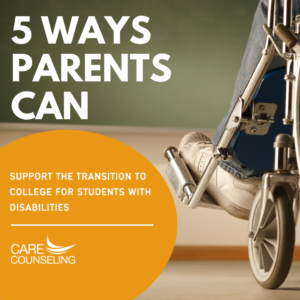5 Ways Parents Can Support the Transition to College for Students with Disabilities
 The transition from high school to college is a big step for students with disabilities. Many of the supports that were in place such as Individualized Education Plans and 504 Plans don’t transfer over to the college setting; however, students with disabilities have the legal right to reasonable accommodations according to the Americans with Disabilities Act ADA (1990). Being familiar with resources available in high school and how these changes at the college level before the transition to college is ideal; however, advocacy is ongoing. Parents of children with disabilities often become skilled advocates as this is a skill that is required throughout their child’s educational journey.
The transition from high school to college is a big step for students with disabilities. Many of the supports that were in place such as Individualized Education Plans and 504 Plans don’t transfer over to the college setting; however, students with disabilities have the legal right to reasonable accommodations according to the Americans with Disabilities Act ADA (1990). Being familiar with resources available in high school and how these changes at the college level before the transition to college is ideal; however, advocacy is ongoing. Parents of children with disabilities often become skilled advocates as this is a skill that is required throughout their child’s educational journey.
Students who struggle with academic learning may have had assignments modified and their courseload lightened. While this may have made coursework feel more manageable and aided in passing classes, this may serve as a disadvantage for students as they enter college. The learning curve at the college level can be a big one not only for academic learning but also for life skills! Altering the courseload requirements and modifying it to make it easier would not be considered reasonable accommodations at the college level. Examples of accommodations that may be accommodated include testing accommodations, access to materials in accessible alternative formats, and adaptive equipment.
Parents want the best for their children, including the desire to see them succeed. The stakes at the college level are high, and the pressure felt by both students and their parent(s) can be overwhelming. Having open communication and equipping students with the skills, tools, and appropriate resources will help prepare them for the best experience possible.
Here are several ways parents can support the transition to college for students with disabilities:
Encourage your student to disclose their disability through the disability resource center at college. It is important that they utilize their self-advocacy skills to be able to do this!
Prepare your student with documents and information on how to access documents that can support them with student disability accommodations. Examples of documents include Individual Educational Plans, 504 Plans, Psychological Evaluations, Assessments for Learning Disabilities or ADHD, Diagnostic Assessments, and Summary of Treatment Letters.
Allow space for independence and learning while being available to offer support, as needed. Letting go can be tough for parents. Your child is now an adult, but they may still feel like a child in many ways. Taking a step back will help facilitate the launch to adulthood. There will likely be many mistakes along the way. Parents can be tempted to protect their children from any negative consequences; however, there may be valuable lessons each is learning throughout the process. Encourage your students to lean on their peers, educational support, and professors.
Parents and parental figures are encouraged to seek out their own support to help navigate the challenges of college for students, especially students with disabilities. Some colleges and universities offer online and in-person support. Individual therapy can help process thoughts, feelings, and experiences related to adjusting to this big transition. Many feelings such as anxiety, excitement, fear, and grief/ loss are often present. Having a space to process these can be incredibly helpful. There are also a lot of book resources such as these: https://www.collegeparentcentral.com/resources-list/
Be familiar with resources related to disabilities and educational rights. Here are resources to learn more:
Individuals with Disabilities Education Act (IDEA) laws: https://sites.ed.gov/idea/about-idea/
Individualized Education Plan (IEP) Evaluations and Eligibility: https://education.mn.gov/MDE/dse/sped/caqa/IEP/
Information about School Choices and Special Education: https://education.mn.gov/MDE/dse/sped/choice/
Resources for Education and Advocacy: https://arcminnesota.org/learn-connect/learning-center/education/
Resources for Students with Disabilities and Their Families: https://www.pacer.org/
Information about Disability Rights: https://www.pacer.org/students/transition-to-life/my-disability-rights.asp
Written By: Charlotte Johnson, MA, LPCC



























